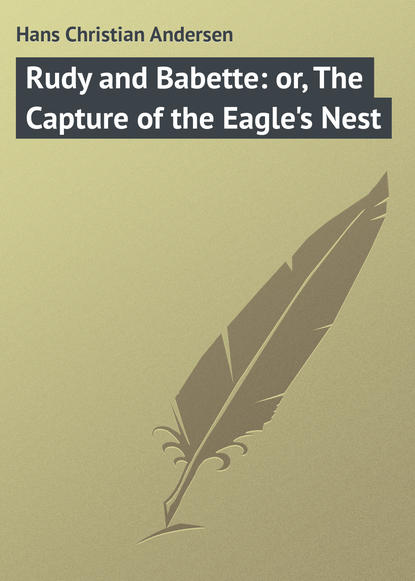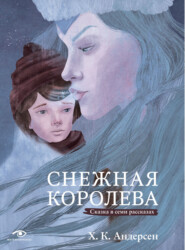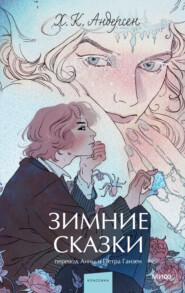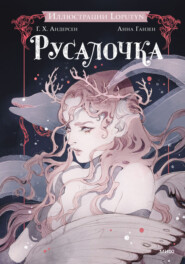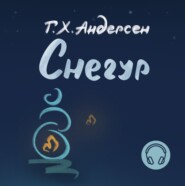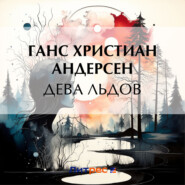По всем вопросам обращайтесь на: info@litportal.ru
(©) 2003-2024.
✖
Rudy and Babette: or, The Capture of the Eagle's Nest
Настройки чтения
Размер шрифта
Высота строк
Поля
"In that deep water!" she said within herself. "He is deep down, as under the glacier!"
And she remembered what Rudy had told her of his mother's death, of his own rescue, and how he had been brought up as one dead out of the crevasse in the glacier. "The Ice-Maiden has him again!"
And the lightning flashed as blinding as a ray of the sun on the white snow. Babette started; the lake lifted itself at that instant, like a shining glacier; the Ice-Maiden stood there, majestic, pale blue, shining, and at her feet lay Rudy's corpse. "Mine!" said she; and round about was again darkness and gloom, and rushing water.
"Cruel!" moaned Babette. "Why then should he die, when the happy day was come! O God! enlighten my understanding! shine into my heart! I cannot understand Thy ways, but I bow to Thy power and wisdom!"
And God shone into her heart. A flash of thought, a ray of light, her dream of last night, as if it were real, seemed to shine through her; she called to mind the words which she had spoken: she had wished for the best thing for herself and Rudy.
"Woe is me! was that the seed of sin in my heart? was my dream a future life, whose string must be snapped for my salvation? Miserable me!"
She sat wailing in the gloomy, dark night. In the deep stillness she thought that Rudy's words sounded again, the last he had uttered: "Earth has nothing more to give me!" They had been said in the abundance of happiness, they came back to her in the depth of her grief.
A couple of years have elapsed. The lake smiles, the banks smile; the vines put forth swelling grapes; steamboats with waving flags hurry past, pleasure-boats with both their sails set fly like white butterflies over the expanse of water; the railway above Chillon has been opened, and leads deep into the Rhone valley. At every station visitors get out, they come with their red guide-books and read to themselves what remarkable things they have to see. They visit Chillon, they see from thence in the lake the little island with the three acacias, and read in the book of a bridal pair who, in the year 1856, sailed thither one evening, of the bridegroom's death and: "next morning the bride's despairing cry was first heard on the shore."
But the guide-books make no mention of Babette's quiet life with her father, not in the mill – strangers live there – but in the pretty house near the railway station, where from the windows she often looks out in the afternoon over the chestnut trees to the snow mountains where Rudy used to disport himself; she sees in the evenings the Alpine glow, the Children of the Sun encamping above and repeating the song of the traveler whose mantle the whirlwind carried away; it took the covering, but not the man himself.
There is a rosy luster on the snow of the mountains, there is a rosy luster in every heart where the thought is: "God lets that which is best come to pass!" but that is not always revealed to us as it was to Babette in her dream.
THE FELLOW-TRAVELER
POOR Johannes was sorely afflicted, for his father was ill, past all hope of recovery. Besides their two selves, not a soul was present in the little room. The lamp on the table was flickering, and it was late at night.
"You have been a good son, Johannes," said the sick father, "and God will, no doubt, help you on in the world." And he gazed at him with mild and thoughtful eyes, fetched a deep sigh, and then died – though he only looked as if he had gone to sleep. But Johannes wept; for now he had nobody in the wide world – neither father, mother, sister, nor brother. Poor Johannes! He knelt down beside the bed, kissed his dead father's hand, and shed many, many bitter tears! But at length his eyes closed, and he fell asleep against the hard bedpost.
He had then a strange dream. He thought the sun and moon came down to him, and he saw his father again in full health and freshness, and heard him laugh as he used to do when he was pleased. A pretty girl, with a gold crown on her long, shining hair, presented her hand to him; and his father said: "Look what a bride you have won. She is the loveliest maid upon earth." He then woke, and all these fine things vanished; his father lay dead and cold in his bed, and nobody was near them. Poor Johannes!
In the following week, the dead man was buried. The son followed close behind the coffin, for he was never again to behold the father who had loved him so dearly. He heard them fling the earth down upon the coffin, and still saw a little corner of it left; but, at the next shovelful, even that disappeared. Then he felt as though his heart would break, so afflicted was he. They sang a psalm round the grave, and it sounded so beautiful that it brought tears into Johannes' eyes. He wept, and felt relieved. The sun shone down gloriously on the green trees, just as if it meant to say: "You must not be so mournful, Johannes. Look how beautifully blue the sky is yonder! Your father is up above, and is begging of the All-merciful that you may thrive at all times!"
"I will always be good," said Johannes, "then I shall join my father in heaven; and what joy it will be to meet him again! How much I shall have to tell him, and how much he will have to teach me about the delights of heaven, just as he used to teach me here on earth. Oh, what joy that will be!"
He fancied it all so plainly that he smiled, while the tears still ran down his cheeks. The birds in the chestnut trees kept twittering, "Twit! twit!" They were gay, although they had been at the funeral; but they knew that the dead man was now in heaven, and had wings much larger and more beautiful than their own; and that he was happy, because he had been good here on earth: and, therefore, they were pleased. Johannes saw how they flew from the green trees out into the wide world, and then he wished to fly away also. But he first cut out a large wooden cross to place on his father's grave; and when he brought it thither in the evening, he found the grave decked with gravel and flowers. This had been done by strangers, who all esteemed the worthy man who had gone to his last home.
Early the next morning, Johannes packed up his little bundle, and put into his girdle his whole legacy, consisting of fifty dollars and a couple of silver shillings, with which he meant to wander forth into the world. But first of all he repaired to his father's grave in the churchyard, where he repeated the Lord's Prayer, and then said, "Farewell!"
Abroad in the fields through which he passed, all the flowers looked fresh and lovely in the warm sunshine. And they nodded in the wind, just as if they meant to say: "Welcome to the greenwood! Is it not delightful here?" But Johannes turned round to give a last look at the old church, in which he was christened as an infant, and where he used to go with his father every Sunday to hear the service, and to sing his psalm; and in so doing he perceived, in one of the upper loopholes of the church tower, the little goblin belonging to it, who stood with his little pointed, red cap on his head, shading his countenance with his arm, so that the sun might not stream into his eyes. Johannes nodded farewell to him; and the little goblin waved his red cap, laid his hand on his heart, and then kissed his hand to him, to show that he was kindly disposed towards him, and wished him a happy journey.
Johannes now thought of how many beautiful things he should see in the wide world, so large and so magnificent as it was; and he went on and on much further than he had ever been before. He did not know the places through which he passed, nor the people whom he met. He was now abroad in a foreign land.
The first night he was obliged to lie on a haycock in the open fields, for he had no other bed. But this he thought was so nice a bed that the king himself could not be better off. The field, and the haycock, with the blue sky above, certainly formed a very pretty bed-chamber. The green grass, dotted with little red and white flowers, was the carpet; the elder bushes and hedges of wild roses were the nosegays that decorated the room; and his washing-basin was the brook, with its clear, pure waters, where the reeds were nodding to bid him good night and good morning. The moon was a large lamp, high up in the blue ceiling, and one that could not set fire to the curtains. Johannes might sleep in peace, and he did so, nor did he wake till the sun rose, and all the little birds around were singing: "Good morrow! Good morrow! Are you not yet up?"
The bells were ringing for church, for it was Sunday. The people were going to hear the preacher, and Johannes followed them, sang a psalm, and heard the word of God. He felt just as if he were in his own parish church, in which he had been christened, and where he sang psalms with his father.
In the churchyard were several graves, some of which were overgrown with very high grass. And he thought how his father's grave would grow to look the same in the end, as he would not be there to weed it and deck it. So he fell to work and tore up the grass, and set up the wooden crosses that had fallen down, and replaced the wreaths that had been blown away by the wind, thinking all the time, "Perhaps some one is doing the same for my father's grave, as I am unable to take care of it."
Before the church door stood an aged beggar, leaning on a crutch. Johannes gave him his silver shillings, and then went forth on his way, lighter and happier than he had felt before.
Towards evening there arose a violent storm, which made him hasten to find a shelter. Darkness soon came on; but at length he reached a small and lonely church that stood on a little hill.
"I will sit down in a corner," said he, as he went in; "I am so tired that I need rest." He then sat down, and folded his hands, and said his evening prayer; and before he perceived it, he was fast asleep, and dreaming, while a thunderstorm was raging abroad.
When he awoke, it was in the middle of the night, but the fearful storm was over, and the moon shone in through the window to greet him. In the middle of the church stood an open coffin, in which lay the body of a man, that was awaiting burial. Johannes was not fearful, for he had a good conscience; and, besides, he knew that the dead never injure any one. It is only living, wicked men that do any harm. Two such bad characters stood beside the dead man that was lying in the church awaiting burial, and they wanted to vent their spite, by not letting him rest in his coffin, and casting his poor body outside the church door.
"Why do you want to do so?" asked Johannes. "It would be very wicked. In Christ's name, let him rest in peace!"
"Oh, stuff and nonsense!" said the two hideous men; "he has taken us in. He owed us money, and couldn't pay it; and now he is dead into the bargain, and we shan't recover a penny! Therefore we will take our revenge, and he shall lie outside the church door like a dog."
"I have nothing in the world but fifty dollars," said Johannes, "which form my whole patrimony; yet will I willingly give them to you, provided you promise truly to leave the dead man in peace. I shall manage without the money. I have strong and healthy limbs, and a merciful God will assist me in times of need!"
"Of course," said the ugly men, "if you pay his debt, we will neither of us lay a finger upon him – that you may depend upon." And hereupon they took the money which he gave them, laughed aloud at his simple good nature, and went their ways. Then he laid the body carefully back into the coffin, folded the dead man's hands, took leave of him and continued his way through a large forest, in a contented frame of mind.
All around him, wherever the moon shone through the trees, he saw numbers of elegant little elves at play. His presence did not disturb them, for they knew him to be a good and harmless son of the earth; for it is only bad people who are not privileged to see the elves. Some of them were not taller than the breadth of one's finger, and wore their long yellow hair fastened up with gold combs. They were rocking themselves, two by two, on the large dewdrops that sparkled on the leaves and the tall grass. Now and then the drop would roll away, and down they fell between the long blades, occasioning a deal of laughter and merriment amongst the tiny folk. It was a pretty sight. Then they sang, and Johannes recognized distinctly all the pretty songs he had learned as a little boy. Large speckled spiders, with silver crowns upon their heads, were set to build suspension bridges and palaces from one hedge to another, which, when spangled by the dew, glittered like glass in the moonshine. These frolics continued till sunrise, when the little elves crept into the flower-buds and the wind took possession of their bridges and palaces, which were tossed upon the air as cobwebs.
Johannes had just left the forest, when the full-toned voice of a man cried out to him, "Ho there, comrade! whither are you going?"
"Into the wide world," said he. "I have neither father nor mother, and am a poor boy; but the Lord will help me in time of need."
"I am likewise going into the wide world," said the stranger. "Shall we keep each other company?"
"Willingly," said he; and so they walked on together. They soon felt a mutual liking for each other, for both were good; only Johannes soon found out that the stranger was much wiser than himself. He had traveled throughout nearly the whole world, and could tell of everything that existed.
The sun was already high when they sat down under a tree to eat their breakfast, just as an old woman was coming up to them. She was very aged, and almost bent double, and supported herself on a crutch-stick, while she carried on her back a bundle of firewood, which she had gathered in the forest. Her apron was tucked up, and Johannes saw three large rods of fern and willow twigs peeping out at each end. When she was quite close to our travelers, her foot slipped, and she fell with a loud scream, for she had broken her leg – poor old woman!
Johannes at once proposed that they should carry the old woman home; but the stranger opened his knapsack, and took out a box, saying that he had an ointment which would immediately make her leg whole again, and so strong that she would be able to walk home by herself, just as if the accident had never happened: only he required that she should give him in return the three rods she carried in her apron.
"That would be well paid," said the old woman, nodding her head in a peculiar manner. She did not like giving up the rods; but, on the other hand, it was still more disagreeable to be lying there with a broken limb. So she gave him the rods, and the moment he had rubbed her leg with the ointment the old dame got up, and walked much better than before. Such were the effects of the ointment; and truly it was not of a sort to be purchased at the apothecary's.
"What do you want with these rods?" asked Johannes of his fellow-traveler.
"They are three very pretty herb-brooms," said he, "and I like them, because I am a foolish fellow."
They then went on a good deal further.
"Look how overcast the sky appears!" said Johannes, pointing before them. "Those are frightfully heavy clouds."
"No," said his fellow-traveler, "they are not clouds; they are mountains – fine, large mountains – at the top of which one may overlook the clouds, and breathe fresh air. And delightful it is, believe me, to stand there! To-morrow we shall assuredly be far out in the wide world."
But they were not so near as they looked, and it took a full day before they had reached the mountains, where the black forests were towering up to the sky, and where blocks of stone might be found as huge as a large town. It seemed a somewhat difficult undertaking to cross them; therefore, Johannes and his fellow-traveler turned into an inn, in order to rest and gather strength for the next day's excursion.
A number of persons were assembled in the tap-room of the inn, where a man was exhibiting a puppet-show. He had just set up his little theater, and the people were sitting round to see the play. But, right in front, a stout butcher had sat himself down in the very best place, while a great bulldog by his side – who looked wondrously snappish – sat staring like the rest of the audience.
The play now began. It was a very pretty piece, with a king and queen, who sat on a splendid throne, with gold crowns on their heads and long trains to their robes; for their means allowed them to indulge in such luxuries. The prettiest little puppets, with glass eyes and large mustaches, stood at all the doors, and opened and shut them, to let in fresh air. It was a very agreeable play, and not at all mournful. But, just as the queen got up, and passed across the stage, no one knows what the huge bulldog took into his head; but, being no longer held by the butcher, he jumped right into the theater, and seized the queen by the middle of her slender waist, so that it cracked again. It was quite shocking to hear.
The poor man who exhibited the show was both frightened and sorry for the loss of his queen, for she was the most elegant puppet in his stock, and the ugly bulldog had bitten her head off. But when the rest of the spectators had retired, the stranger who traveled with Johannes said that he would set her to rights, and taking out his box, he smeared the puppet with the same ointment that had cured the old woman's broken leg. The moment this was done, the puppet was whole again, and could even move all her limbs of herself, and no longer required to be pulled by wires. The puppet was like a human being, except that it could not speak. The showman was vastly delighted, for now he had no longer any occasion to hold this puppet, who could dance of her own accord, which none of the others could do.
Late at night, when all the folks at the inn had gone to bed, somebody was heard to sigh so dreadfully deep, and so frequently, that the whole household got up, to see what could be the matter. The showman went to his little theater, for it was from thence the sighing proceeded. All the wooden puppets were lying in a heap; the king and his body-guard it was who were sighing so piteously, and staring with their glass eyes, because they wished to be smeared a little like the queen, in order that they might move of themselves. The queen knelt down and lifted up her pretty crown, saying, "Take this, but do smear my husband and my courtiers." The poor showman could not then help crying, for he was really sorry for his puppets. He immediately promised Johannes' fellow-traveler all the money he might earn on the following evening through his puppet-show, if he would only smear four or five of his prettiest puppets. But the fellow-traveler said he did not require anything but the large sword that he wore at his side, on receiving which, he besmeared six puppets, that immediately danced so gracefully that all living girls that beheld them were irresistibly impelled to dance likewise. The coachman and the cook began dancing, then the waiters and the chambermaids, and all the strangers present, as well as the shovel and the tongs – only the latter fell down at the very first leap. They had indeed, a merry night of it!
Next morning, Johannes started with his fellow-traveler, before any of the others were astir, and crossed the large forest of fir-trees, in their way up the high mountains. They climbed to such a height that the church steeples below looked like little blue berries in the green grass, and they could see for miles and miles around, where they had never yet been. Johannes had never before seen so much at once of the beauties of this lovely world. And then the sun shone so warmly through the fresh blue air, and the huntsmen's horns echoed so beautifully between the mountains, that tears came into his eyes, and he could not forbear exclaiming, "All-merciful God! what a kind Father Thou art to us, to have given us all the fine things to be seen in the world!"





